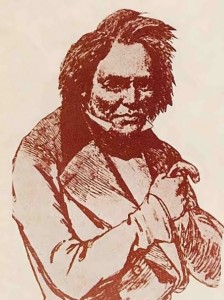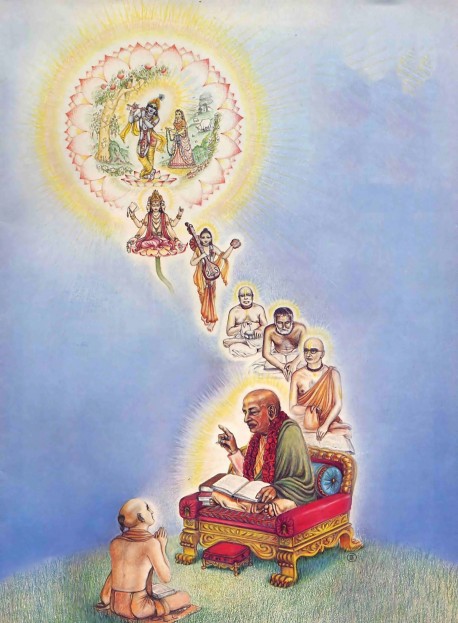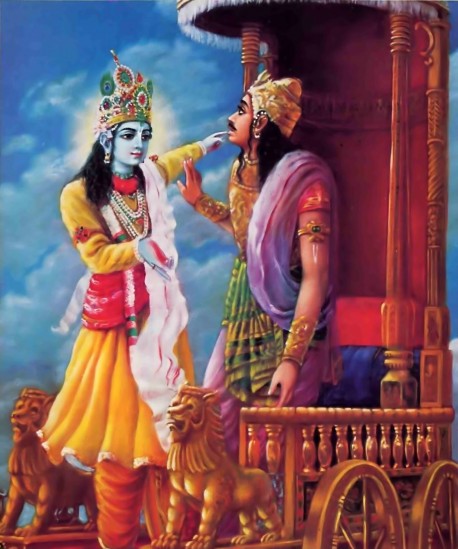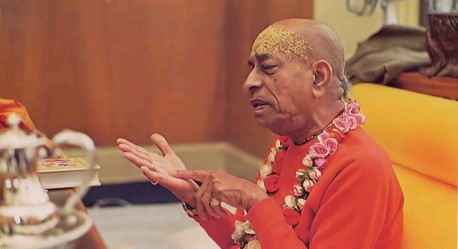Part 2: How to Make the “Leap of Faith”
 Soren Kierkegaard, “the father of existentialism,” said we have to make the “leap of faith,” and he saw the goal as God. He wrote, “There is a God—His will is made known to me in holy scripture and in my conscience.” “That’s all right,” says His Divine Grace A.C. Bhaktivedanta Swami Prabhupada, “but to know God’s will you need more than that….”
Soren Kierkegaard, “the father of existentialism,” said we have to make the “leap of faith,” and he saw the goal as God. He wrote, “There is a God—His will is made known to me in holy scripture and in my conscience.” “That’s all right,” says His Divine Grace A.C. Bhaktivedanta Swami Prabhupada, “but to know God’s will you need more than that….”
Hayagriva dasa: Soren Kierkegaard lamented the disintegration of Christianity as an effective form of worship and considered modern Christendom to be a kind of sickness—a corruption of Christ’s original message.
Srila Prabhupada: Christianity is Christianity. You cannot call it modern or ancient, nor can you say God is modern or ancient. Either a person is a Christian, or he is not. In other words, either he follows the orders of Christ, or he doesn’t. If he does not follow the tenets of his religion, how can he claim to belong to that religion? This is applicable to all religions. For instance, there are many so-called Hindus who do not believe in anything, yet they consider themselves Hindus and brahmanas [priests]. This is insulting.
Hayagriva dasa: Concerning the purpose of prayer, Kierkegaard wrote in his Journals, “The true success in prayer is not when God hears what is prayed for, but when the person praying continues to pray until he hears what God wills.”
Srila Prabhupada: Yes, that is very nice. Through prayer one becomes qualified to understand God, to talk with God, and to receive His directions. As stated in the Bhagavad-gita [10.10]:
tesam satata-yuktanam
bhajatam priti-purvakam
dadami buddhi-yogam tam
yena mam upayanti te
“To those who are constantly devoted and worship Me with love, I give the understanding by which they can come to Me.” Our ultimate goal is to give up this material world and go back to home, back to Godhead. Prayer is just one form of service. There are nine kinds of devotional service that we can perform, as explained by Prahlada Maharaja in the Srimad-Bhagavatam [7.5.23]:
sravanam kirtanam visnoh
maranam pada-sevanam
arcanam vandanam dasyam
sakhyam atma-nivedanam
“Hearing about the transcendental name, form, qualities, paraphernalia, and pastimes of the Lord, chanting about these things; remembering them; serving the lotus feet of the Lord; offering the Lord respectful worship with incense, flowers, water, and so on; offering prayers to the Lord; becoming His servant; considering the Lord one’s best friend; and surrendering everything unto Him—these nine activities constitute pure devotional service.”
Whether you perform all nine processes or some of them or only one of them, you can progress in spiritual life. For example, when a Christian or a Muhammadan offers prayers, his service is as good as the Hindu’s service to the Deity in the temple. God is within, and when He sees that we are sincerely serving Him, He takes charge and gives us directions by which we can swiftly approach Him. God is complete in Himself;
He is not hankering after our service. But if we offer Him service, we can become purified. When we are completely purified, we can see God and talk with Him. We can receive His instructions personally, just as Arjuna did in the Bhagavad-gita.
Hayagriva dasa: For Kierkegaard, faith in God develops when the soul is “willing to stand transparent before God in his full integrity.”
Srila Prabhupada: Standing transparent before God means engaging in God’s service. But to engage in God’s service we must understand that we are His parts and parcels. Just as each part of the body engages in the service of the entire body, so every living entity is meant to engage in the service of God, Krishna. As soon as you engage in Krishna’s service, you are self-realized. That is mukti, liberation from the miseries of material life. The karmis [fruitive workers], jnanis [mental speculators], and yogis are trying to realize the self, but because they are not engaged in rendering service to the Supreme Self, Krishna, they are not liberated. We are therefore teaching this Krishna consciousness for the ultimate self-realization of everyone.
Hayagriva dasa: But Kierkegaard sees self-realization arising out of the expression of the will. He thought that the more self-realized a person is, the more powerful is his will and the better he is able to make proper decisions.
Srila Prabhupada: But if you are part and parcel of the whole, you have to take decisions from the whole. You cannot make the decisions. The finger does not make decisions for the entire body. The only decision you have to make is the decision to serve Krishna—the orders come from Him. Krishna ordered Arjuna to fight, and at the end of the Bhagavad-gita Arjuna decided to abide by Krishna’s will. This is the only choice we have: either to abide by Krishna’s will or to defy His will. After we decide to obey Krishna, Krishna or His representative makes all the other decisions.
Hayagriva dasa: Then what is the meaning of full will?

Srila Prabhupada: Full will means to surrender to Krishna fully—to obey the orders of the Supreme absolutely.

Hayagriva dasa: Concerning despair, Kierkegaard thought that despair can actually bear fruit in that it can lead one to desire a genuine life of self-realization. In other words, despair can be a springboard to higher consciousness.
Srila Prabhupada: In Sanskrit this is called nirasam paramam sukham: “When one despairs, that is a great happiness.” When a person despairs, it means that everything is finished, all responsibility is gone, and he is relieved. Out of despair Arjuna was thinking of becoming a mendicant. When we despair of all happiness in material life, we may then turn to spiritual life. Sometimes Krishna smashes all of our material resources—so that, out of despair, we may fully engage in His devotional service. In other words, when we want to become God-conscious but at the same time, out of strong attachment, we want material enjoyment, Krishna will sometimes wreck us materially. At such times we often think that He is being unkind to us, and we despair. We don’t realize that this is Krishna’s mercy—that He is removing all impediments so that we can fully and absolutely surrender.
Once Indra, the Lord of heaven, was forced to take on the body of a hog, and he had to come down to earth as that lowly animal. As a hog, Indra had a hog wife, hog children, and so on. After some time Lord Brahma came down and told him, “My dear Indra, you have forgotten your position. You were once the Lord of heaven. You once possessed great opulence. Now that you are a hog, you have forgotten your previous exalted position. Please leave this filthy life and come with me.” Yet despite Brahma’s pleadings Indra was not convinced. He said, “Why should I go with you? I am very happy. I have my wife, children, and home.” Seeing that Indra had become very much attached to his hog existence, Brahma began to kill all his hog children. Finally, Brahma killed Indra’s hog wife. When Indra saw that his wife was killed, he despaired: “Oh, you have killed my whole family!” It was only then that Indra agreed to go back to the heavenly kingdom with Lord Brahma. Similarly, Krishna sometimes creates a situation in which the living entity will despair and, out of despair, turn to Him and fully surrender unto Him.
Hayagriva dasa: So faith grows out of despair?
Srila Prabhupada: Yes, to strengthen our faith in God, we have to give up all hope of happiness in this material life. We have to despair of material happiness.
Hayagriva dasa: Concerning individuality, Kierkegaard wrote, “God is the origin and wellspring of all individuality. … [This individuality] is the gift of God through which He permits me to be, and through which He permits everyone to be.”
Srila Prabhupada: This idea is explained in the Katha Upanisad [2.2.13]: nityo nityanam cetanas cetananam. God is a living being, and we are also living beings. Just as He is eternal, we are also eternal. But the difference is that whereas qualitatively we are the same, quantitatively we are different. God is infinite, and the living entities are infinitesimal. Therefore, all the living entities are being maintained by God. We are all individual and eternal parts of God, so our natural position is to serve Him and to love Him.
Hayagriva dasa: Kierkegaard thought that each of us is in a constant state of becoming.
Srila Prabhupada: Becoming what? What is the goal? The goal is Krishna. Thus in the Bhagavad-gita Krishna says,
mattah parataram nanyat
kincid asti dhananjaya
mayi sarvam idam protam
sutre mani-gana iva
“O conqueror of wealth, there is no truth superior to Me. Everything rests upon Me, as pearls are strung on a thread” [Bg. 7.7]. Krishna is the ultimate truth—the supreme goal—and completeness means coming to Krishna consciousness.
Hayagriva dasa: But even when one is fully Krishna-conscious and in association with Krishna, isn’t there still a process of becoming?
Srila Prabhupada: No. The becoming process ends. There are, however, spiritual varieties. Everything is complete in the spiritual world, but the living entity enjoys varieties of service to Krishna. Sometimes he sees Krishna as a cowherd boy, sometimes as Yasoda’s child, sometimes as Radharani’s consort. Sometimes Krishna is in Mathura; sometimes He is in Vrndavana. There are many spiritual varieties, but everything is complete in itself—there is no question of becoming. One reaches the point where he is simply enjoying variety—that’s all.
Hayagriva dasa: What is the difference between enjoying spiritual variety and enjoying material variety?

Srila Prabhupada: It is artificial to try to enjoy material variety. Material variety is like a plastic flower. A plastic flower has no aroma, so the enjoyment of a plastic flower cannot be the same as the enjoyment of a real flower. It is not satisfying. It is simply artificial, a bluff.
Hayagriva dasa: Whereas Hegel emphasized speculative thought, Kierkegaard emphasized action. Kierkegaard saw freedom in proper action.
Srila Prabhupada: Yes, spiritual life means proper action. It is improper to think that when we attain the perfectional stage we become inactive. That is the impersonalistic, Mayavada theory. Mayavadis contend that the living entity is like a jug. A jug makes some sound only as long as it is not full of water. Similarly, the Mayavadis say, when we become spiritually “full,” we are “silent,” or inactive. But from the Bhagavad-gita we understand that the soul is never inactive. When inactivity is recommended, this simply means that we should not speak or act foolishly. If we cannot talk intelligently, we had better stop talking. But you cannot equate that inactivity with perfection.
Hayagriva dasa: Kierkegaard felt that truth is relative and subjective. He thought we could discover truth through personal, individual reflection, which he called “inward passion.”
Srila Prabhupada: Truth is truth, and it is absolute. You may manufacture many relative truths, but the Absolute Truth is one. If you have no knowledge of the Absolute Truth, you emphasize relative truths. You may have “inward passion” or whatever, but if you do not know the ultimate goal, you may be misled. It is all right to say that passion leads to truth. But passion means activity. Where will your activity end? What is the purpose of your activity? You may drive your car, but if you do not know where to go, what is the point? You are simply wasting your energy. Of course you may say, “I do not know where to go, but that doesn’t matter. Simply let me start my car and go.” But is this a very good proposal?
Hayagriva dasa: For Kierkegaard it is not what is done that counts, but how it is done.
Srila Prabhupada: This is a dog’s obstinacy.
Hayagriva dasa: This is the kind of subjectivity that is always uncertain. And uncertainty creates anxiety.
Srila Prabhupada: Yes. One who does not know life’s aim will always be in anxiety.
Hayagriva dasa: For Kierkegaard, this anxiety and uncertainty are dispelled by what he called the “leap of faith.”
Srila Prabhupada: Yes, but you must make your leap toward a goal. Unless you know the goal, the fixed point, your action and energy may be misdirected.
Hayagriva dasa: Kierkegaard saw the goal as God. He felt that after passing through the aesthetic and ethical stages of life [see BTG 12/10], we should then use all our energy to reach God through Jesus Christ.
Srila Prabhupada: That is a good position. That is our process—to approach God through the bona fide spiritual master. But it is not necessary to pass through any lower stages. If you can reach God through Jesus Christ, why not take to God immediately? Our process is that you must surrender yourself to the spiritual master in order to understand the highest truth. In the Bhagavad-gita Krishna says,
tad viddhi pranipatena
pariprasnena sevaya
upadeksyanti te jnanam
jnaninas tattva-darsinah
“Just try to learn the truth by approaching a spiritual master. Inquire from him submissively and render service unto Him. The self-realized soul can impart knowledge unto you because he has seen the truth” [Bg. 4.34]. This is the process. It is not that we continue on our own way, hoping to take the right path through experience. If you do not know the right direction, your endeavors will be frustrated. This material world is like the vast ocean, and in the middle of the vast ocean, you do not know where to direct your ship. If you simply have a ship without a captain, you will go one way and then another and simply waste your energy. A captain is needed to give direction. That captain is the guru. If Kierkegaard accepts Christ, then he is accepting some guidance.
Hayagriva dasa: Kierkegaard felt that the directions of God are expressed through scripture and the individual conscience. In his Journals he wrote, “There is a God—His will is made known to me in holy scripture and in my conscience.”
Srila Prabhupada: That’s all right, but to know God’s will you need more than that. Besides following the holy scriptures and your conscience, you have to associate with saintly persons and follow the instructions of the bona fide spiritual master. Sadhu, sastra, guru vakya, cittete kariya aikya: “We can approach God by understanding a saintly person [sadhu], studying the Vedic scriptures [shastra], and following the instructions of the bona fide spiritual master [guru].” Sadhu, shastra, and guru corroborate one another. A sadhu is he who talks and acts in terms of the scriptures. And the guru is he who teaches according to the scriptures. A guru cannot manufacture words that are not in the scriptures. When we receive instructions from all three, we can progress perfectly in our understanding of the Supreme Personality of Godhead.
Hayagriva dasa: Kierkegaard thought that because God sees “everything as equally important and equally insignificant, [He] can only be interested in one thing: obedience.”
Srila Prabhupada: Yes, and God demands that full obedience (sarva-dharman parityajya mam ekam saranam vraja). Our primary obedience should be to the Supreme Personality of Godhead, and we should obey the spiritual master because he is the representative of God. If a person carries out the orders of God, he can become a bona fide spiritual master, or guru. A guru does not manufacture anything. He simply presents what God speaks in the scriptures. It is not that we accept just anyone’s proclamations about God. Statements must be corroborated by the standard scriptures.
Hayagriva dasa: Kierkegaard said, “As an act of worship offered to God, we should renounce everything….”
Srila Prabhupada: Worship begins with the renunciation of ulterior motives. Our only business is to love God, and a first-class religious system teaches its followers to love God without ulterior motive. Such worship cannot be checked by material considerations. In any condition we can love God, and God will help us to love Him.

Leave a Reply